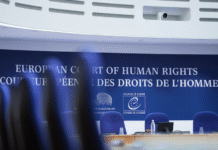Any individual who has a completed a four-year university education will from now on be able to become an administrative judge in Turkey, according to a new presidential decree.
Decree No. 703 was issued on Tuesday by President Recep Tayyip Erdoğan, who began his second term as president after taking the oath of office on Monday.
Vice president of the Union of Judges Nuh Hüseyin Köse tweeted on Tuesday that anyone with a four-year degree can become an administrative judge according to the new decree.
“The legal obstacle before graduates of four-year courses of study such as physiotherapy, veterinary medicine, French language, climate engineering, Sumerology and medicine has been lifted,” he wrote, adding that these people have been granted the right to take the examination to become an administrative judge.
The Turkish government has arrested a total of 2,431 judges and prosecutors and dismissed 4,424 others since a controversial military coup attempt on July 15, 2016, a Constitutional Court general assembly ruling revealed in August 2017.
A comprehensive report titled “Turkey’s descent into arbitrariness: The end of rule of law” published by SCF in April 2017 provides detailed information on how the rule of law has lost meaning in the Turkish context, confirming the effective collapse of all domestic judicial and administrative remedies available for Turkish citizens who lodge complaints for rights violations.
It lists many recent cases showing the ways in which Turkey’s autocratic President Recep Tayyip Erdoğan and his associates in the government manipulate the judiciary through loyalists and partisans. An unprecedented intimidation campaign against independent judges and prosecutors including unlawful arrests and arbitrary assets seizures was pursued by political authorities
Erdoğan and his Justice and Development Party (AKP) government are heavily criticized for destroying the separation of powers in the country and creating their own judiciary, which acts on orders from Erdoğan.
Meanwhile, possession of the title of professor is no longer a criterion to be appointed a university rector in Turkey, according to a recent decree issued by the government, which dismissed more than 7,500 academics so far under a state of emergency.
Government decree No. 703, which was issued by the Turkish government on Monday, has removed the phrase “individuals possessing the academic title of professor” from the relevant law governing the appointment of university rectors.
Currently, university rectors are appointed directly by the president in Turkey.
The AKP government issued two decrees in October 2016 which among other things canceled the intra-university elections that used to be held to elect university rectors.
According to the former system, universities held elections within their institutions, but the ultimate decision lay with the president. President Erdoğan insisted that the abolition of the election system would be beneficial for the country. The move attracted widespread criticism in that it would eliminate universities’ autonomy.
Moreover, journalists wanting to get hold of a press card in Turkey will now have to apply to the presidential palace, according to a new presidential decree published in the Official Gazette early Tuesday.
The changes to the procedure required to obtain a press card come after the publication of a decree that transfers responsibility for issuing the cards from the Directorate General of Press and Information (BYEGM), which was affiliated with the now abolished Prime Ministry, to the Presidency Directorate of Communication.
The policy requiring that journalists apply to state institutions to obtain credentials is widely perceived as an instrument that allows the state to control the press. News that press cards will now be issued by the presidency is unlikely to ease such concerns. Rather, it will augment President Erdoğan’s notoriously tight control of the media in Turkey and further undermine the already limited ability of journalists working in the country to cover news in an independent manner.
Turkey is ranked 157th among 180 countries in the 2018 World Press Freedom Index released by Reporters Without Borders (RSF). If Turkey falls two more places, it will make it to the list of countries on the blacklist, which have the poorest record in press freedom.
Turkey is the biggest jailer of journalists in the world. The most recent figures documented by SCF show that 239 journalists and media workers were in jail as of July 9, 2018, most in pretrial detention. Of those in prison 178 were under arrest pending trial while only 61 journalists have been convicted and are serving their time. Detention warrants are outstanding for 143 journalists who are living in exile or remain at large in Turkey.
Detaining tens of thousands of people over alleged links to the Gülen movement, the government also closed down some 200 media outlets, including Kurdish news agencies and newspapers, after a coup attempt in Turkey on July 15, 2016. (SCF with turkishminute.com)















